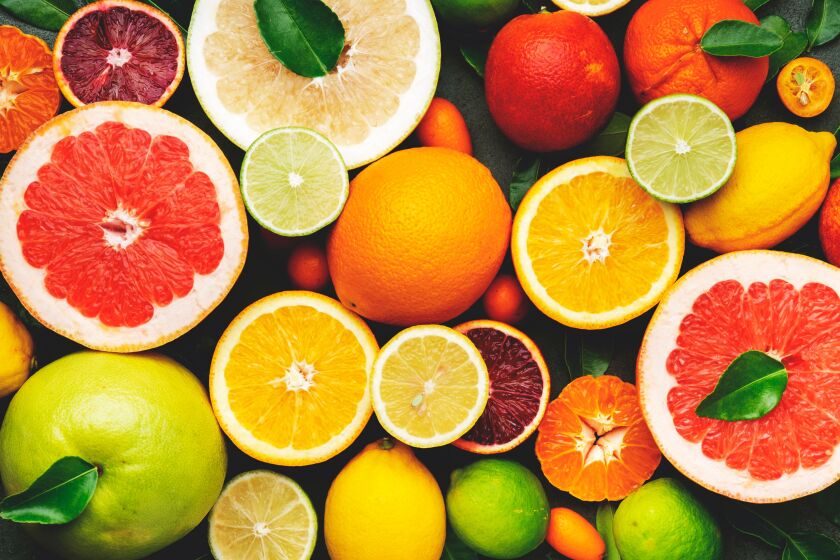Vitamin C, also known as ascorbic acid, is a water-soluble vitamin, which means it cannot be stored in the body and we must take it from dietary sources. Although the advantageous effects of fruits and vegetables that are rich in vitamin C have long been recognized, it was not isolated scientifically until 1933.
 |
| Source: Chicago Sun Time |
Physiological function
Vitamin C plays an essential role in the production of collagen in the body, which is a type of protein needed by various tissues including the skin, tendons, ligaments, blood vessels, bones and cartilage. It is known for its role in the process of tissue growth and repair.
Additionally, vitamin C is an antioxidant, which can help to neutralize free radicals in the body. This is important as free radical build up in the body over time is associated with advanced aging and health conditions such as cancer, heart disease and arthritis.
It also helps in the prevention of some potentially fatal diseases such as scurvy and may help to reduce the duration of symptoms of the common cold.
Deficiency
When dietary consumption of vitamin C is insufficient, the production of collagen is interrupted and cannot replace the collagen needed, resulting in the breakdown of tissues.
This leads to a health condition known as scurvy, which can be directly caused by Vitamin C deficiency. Symptoms of scurvy may include:
- Muscle pain, particularly in the legs
- Joint pain
- Fatigue
- Redness on skin
- Swollen gums and possible bleeding
- Dyspnea
All vitamin C needed for normal bodily functions needs to come from daily dietary consumption, as it cannot be produced or stored in the body.
Although vitamin C deficiency and resulting symptoms of scurvy are uncommon in today’s society, the prevalence is higher in particular populations that have less access to fresh fruit and vegetables. People who are elderly, drug-dependent or have a low income are more likely to suffer.
Excess
Consuming high quantities of vitamin C is not considered to be a great health concern as it is a water-soluble vitamin that is excreted in the urine when taken in excess. However, it may cause symptoms with high doses (greater than 2000 mg daily) such as:
- Diuresis
- Diarrhea
- Gas
- Nausea
Vitamin C also increases the absorption of iron from food. While this can be a beneficial aspect in some populations, people with hemochromatosis will be more likely to build up iron in the body and should avoid vitamin C supplementation.
Additionally, pregnant women should not be advised to take large doses of vitamin C, as the infant may experience rebound scurvy at birth due to the drop in vitamin C intake.
The common cold
Vitamin C is often promoted to help in the prevention and treatment of the common cold. However, the scientific evidence supporting this recommendation is conflicting.
It appears that taking several doses of vitamin C throughout the day when initial symptoms of a cold present may be effective at shortening the duration and severity of symptoms. Taking vitamin C as a preventative method, however, has not been shown to reduce the frequency of the common cold.
Dietary sources
Although the recommended dietary intake remains in debate, most practitioners agree approximately 45-90 mg/day is an appropriate amount in most populations. Increased doses for use to treat the common cold range from 200 to 2000 mg/day usually split into three doses.
Vitamin C can be found in a variety of fresh fruit and vegetables including:
- Berries
- Broccoli
- Brussels sprouts
- Cantaloupe
- Cauliflower
- Grapefruit
- Kiwi fruit
- Leafy greens
- Mango
- Orange
- Papaya
- Peppers
- Pineapple
- Potatoes
- Tomatoes
- Squash
- Watermelon
Most people can easily reach the recommended daily intake of vitamin C by consuming a normal diet with sufficient fruit and vegetables.
Source: https://www.news-medical.net/health/What-is-Vitamin-C.aspx
Comments
Post a Comment